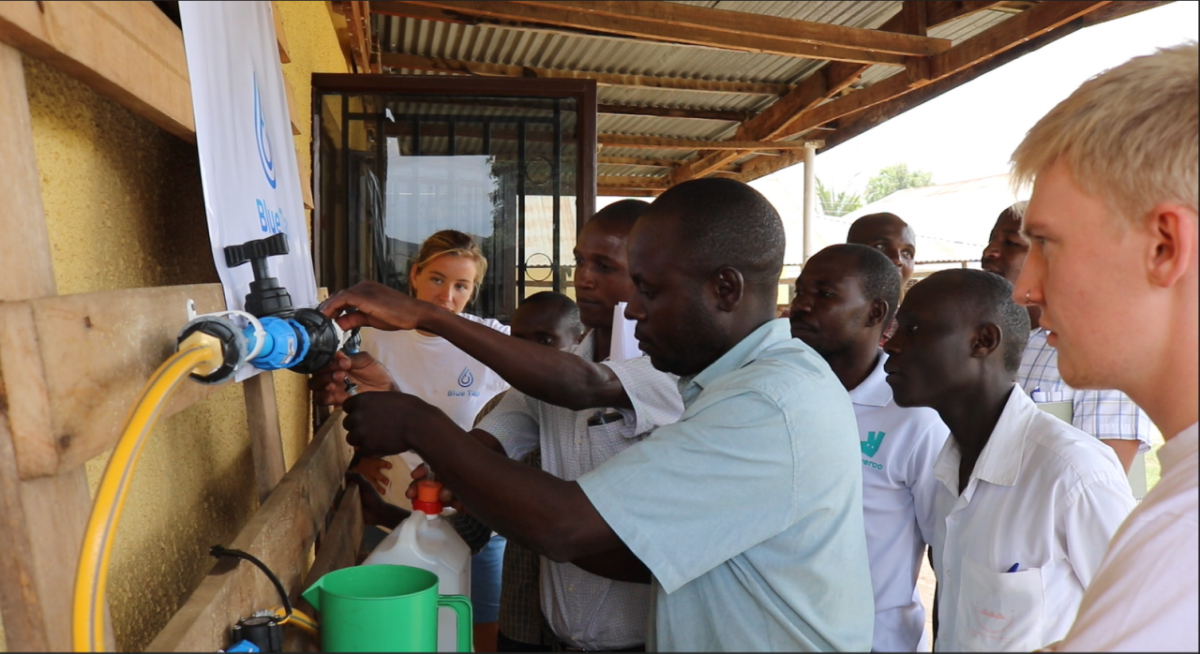Blue Tap CIC: Meet the Team Bridging the Gap for Clean Water Accessibility

Now that the Cisco Global Problem Solver Challenge 2021 winners have been officially announced, we are excited for you to learn more about each winning team and the story behind each innovation. The Cisco Global Problem Solver Challenge is an annual competition that awards cash prizes to early-stage tech entrepreneurs solving the world’s toughest problems. Now in its fifth year, the competition awarded its largest prize pool ever, $1 million USD, to 20 winning teams from around the world.
I recently had the opportunity to interview Tom Stakes, Chief Technical Officer, and Rebecca “Becky” Donaldson, Chief Operations Officer, of Blue Tap CIC, winner of a Second Runner Up $50,000 USD prize. The Blue Tap team designed a chlorine doser, that inserts the correct amount of chlorine into a piped water system to make it safe to drink. The simplicity of the design makes it cost-effective to produce, install, and maintain.
What problem is your technology solution trying to solve?
Becky: The key problem we’re trying to solve is bridging the gap between having access to clean water and water that’s not safe to drink for 1.4 billion people. That’s where our solution comes in.
Can you explain how the solution works?
Becky: At Blue Tap we’ve developed a chlorine doser that puts chlorine into water on the way up to a tank where it sits, and the chlorine disinfects the water so that it’s safe to drink. Alongside that, we’re developing a monitoring system that will be connected to the Internet of Things so we can always see how much water is always being purified.
What inspired you to develop this solution?
Becky: The idea came from [Blue Tap CEO] Francesca O’Hanlon’s experience with a beneficiary request installation for households in Mexico. They were using chlorine tablets to chlorinate their water, but they were finding that they didn’t disperse properly, so some of the water was not safe and causing illnesses. When Francesca came to Cambridge, she met Tom and I, and we took her rough first prototype and made it into the more sophisticated doser that we have now, which works in a wide range of operating environments.
Tom: The idea for the digital aspect came from the transformation from household technology to small utility community scale technology. If you start purifying water at the community level, then the chlorine is much more cost effective. After that, one of the issues you have is confirming and recording that the water has been purified properly so you can have certainty in the quality of the water and have enough money to maintain the technology properly. That’s where the monitoring technology came in as a solution to that.
How will winning a prize in the Cisco Global Problem Solver Challenge help you advance your business?
Becky: I think it’s monumental, really. For starters, it gives us the most important thing, which is time to take the technology out to the field. We plan to have people using it by October.
Tom: It also gives us the additional cash on that field trial to subsidize or to help fund sensors that will be used to collect data to help develop and refine the monitoring system.
Becky: I’m a biomedical engineer. Tom is an aeronautical engineer. This funding will really help to enhance our digital capabilities alongside funding the development of the Internet of Things technology which will optimize the solution for scale.
How has the global pandemic impacted your work?
Tom: The biggest delay was not being able to get out to the field as quickly as we liked due to quarantine restrictions. We couldn’t take the risk of adding extra thousands of pounds to the costs of field trials.
Becky: We continued to speak to people as much as possible, both in-country and global experts, to maintain our human-centered design approach. Although the Blue Tap team has not been able to physically be there because of financial and planning constraints, we will be able to go back out soon now, which is good.
Why did you decide to start your own social enterprise versus going to work for a company?
Becky: I personally like entrepreneurship because it gives you the freedom to create the future that you want to see. We’re all passionate about solving the water challenge. It doesn’t really feel like a choice to make – I never really thought about doing something else. So much of your life is at work – I don’t think I’d be properly happy if I was just there to get money at the end.
Tom: It’s nice to be able to create your own working style and environment, as well as having the freedom to approach a problem in your own way. There’s something both intimidating and exciting about having to solve all your problems yourself.
What advice do you have for other social entrepreneurs?
Becky: I would say that a key thing is learning. Not being afraid to start when you don’t know anything because it’s more of a learning journey. The sooner you start, the more you learn by the time you need to get to where you need to be.
Tom: You will make mistakes but know that having humility and being willing to adjust and accept you might be wrong is the most important thing. That’s really shaped my personal experience of doing this.
Stay tuned for more articles in our blog series, featuring interviews with every Cisco Global Problem Solver Challenge 2021 winning team!

